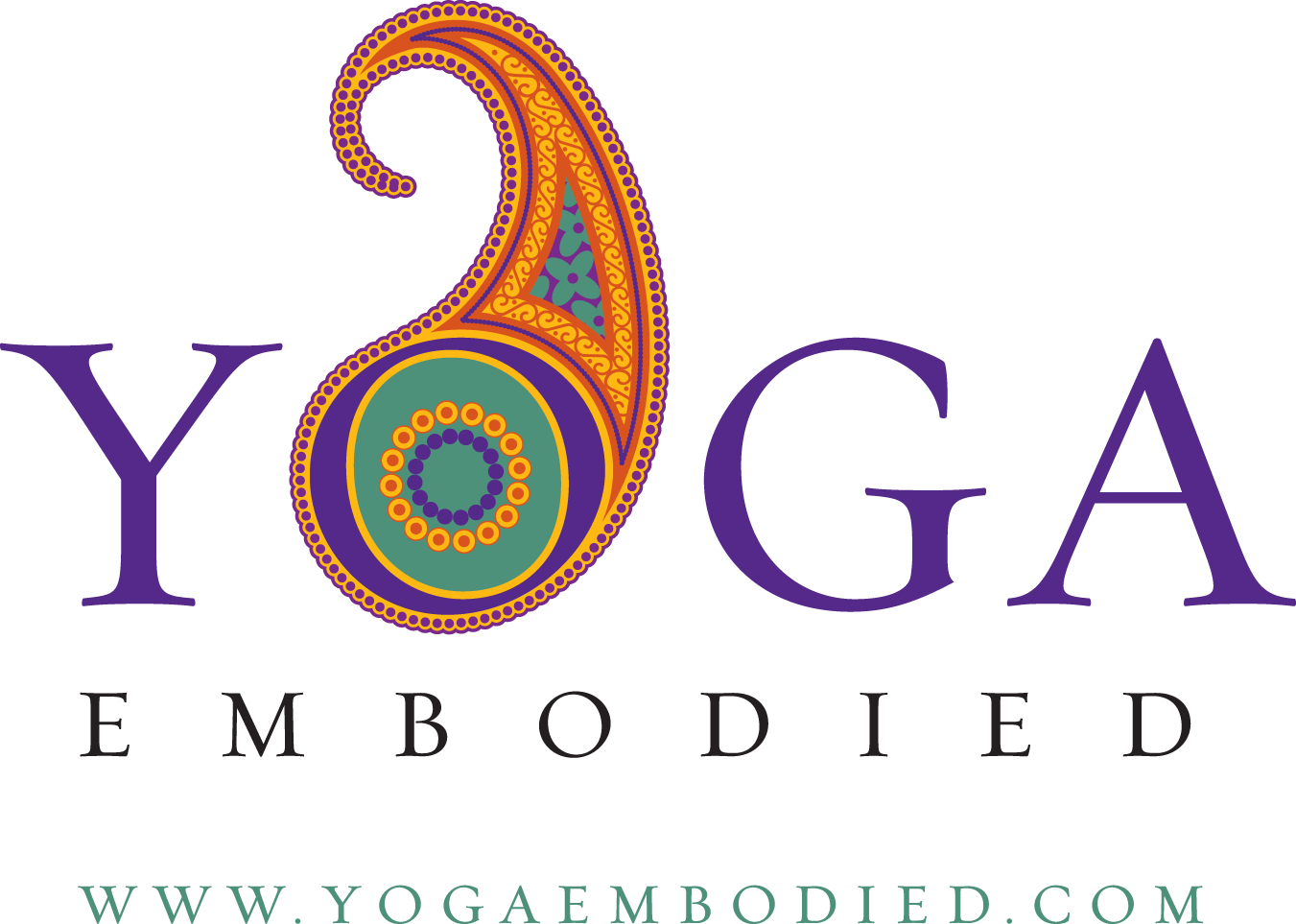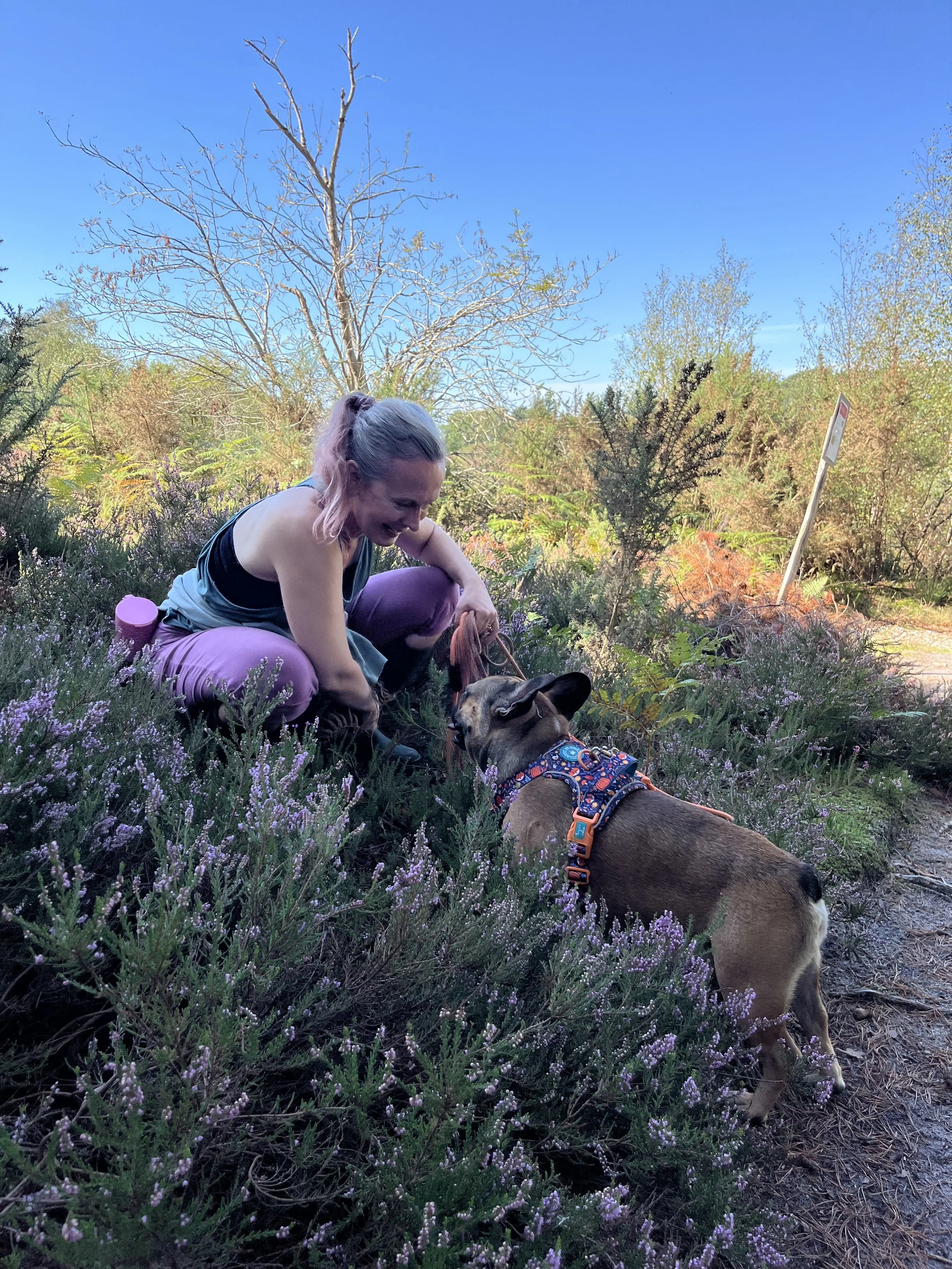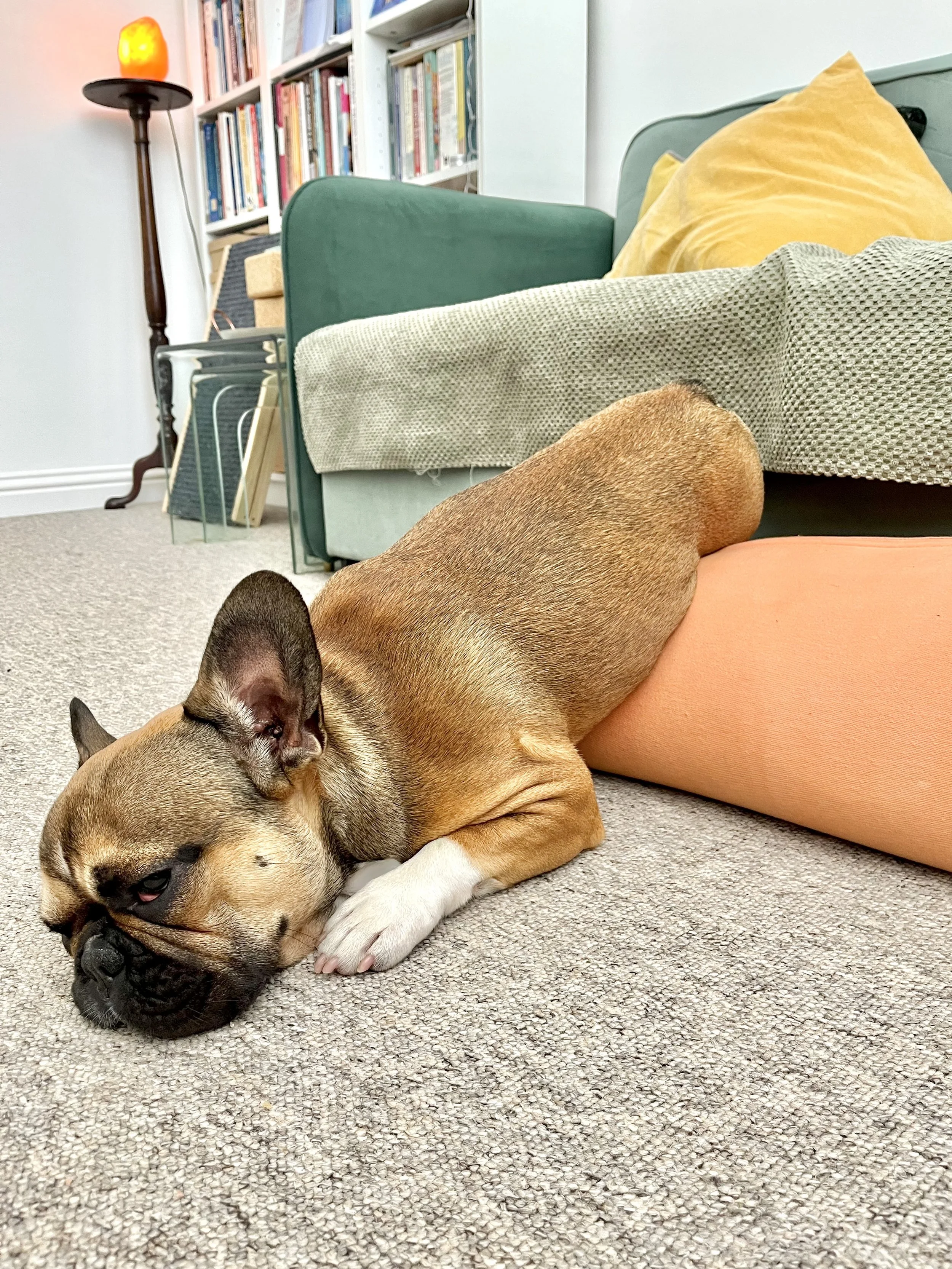Seizure Support Guide
Navigating life with a seizure dog can be challenging, devastating, and full of anxiety and stress. I know because Alfie experiences seizures. A lot of seizures.
Our life revolves around Alfie because we need to be with him 24/7 - just in case he gets a seizure or other neurological challenges. Plus, he needs his medication. It’s a big responsibility to give to anyone else. But we love him and we learn a lot.
I am not a vet, neurologist or behaviourist, so any information here is our experience, my own contemplations (at this moment), and I hope it can offer some support. I know, many of the connections I’ve made online, especially via Alfie’s Instagram account, have been truly supportive. My yoga practice and the spiritual side of yoga as well as my interest in science-based evidence, are what are guiding my writings here. It’s also what has informed the online course Yoga, Movement & Calm for Dog Parents.
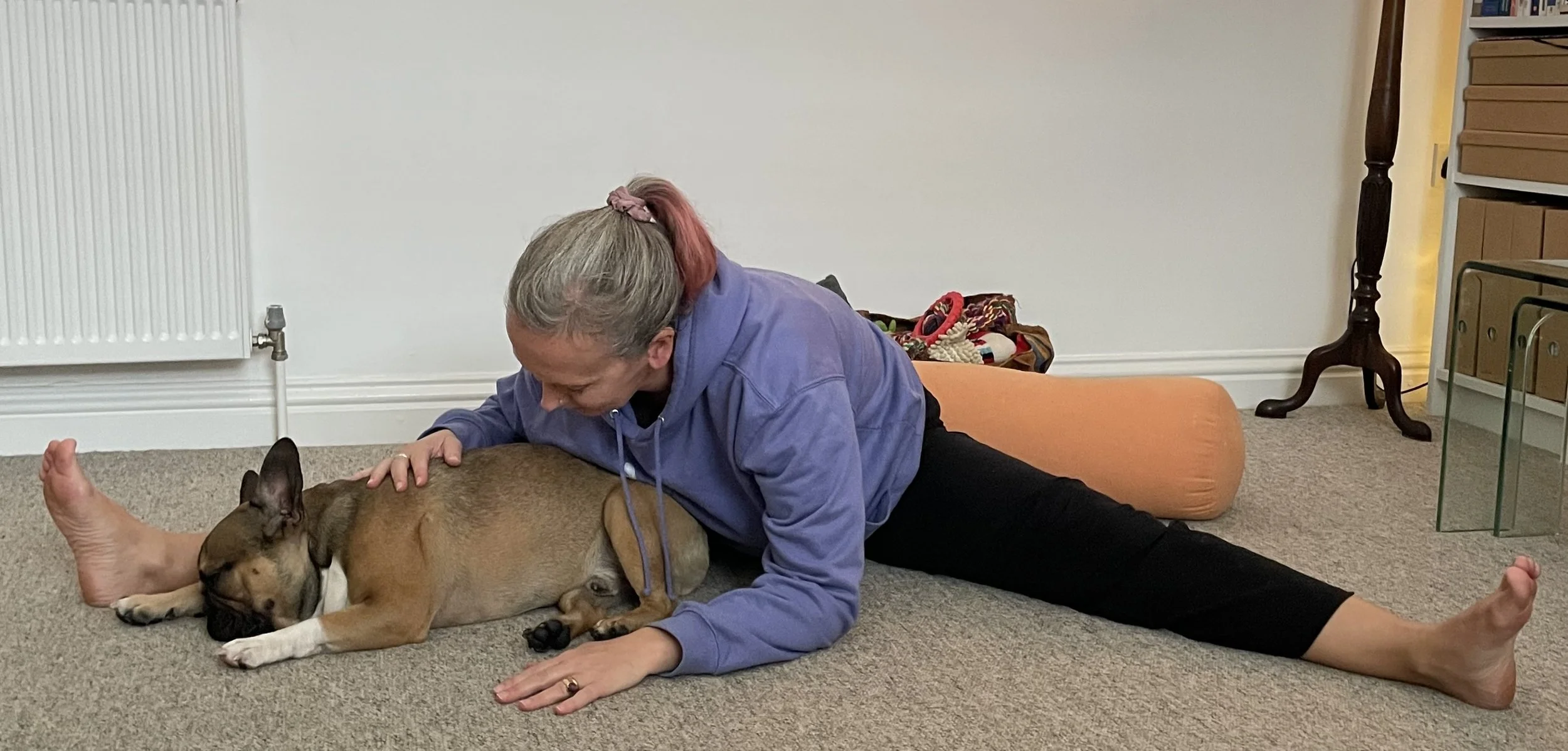
Dog seizure guide
Logical | Emotional | Spiritual
What I am sharing is for you, the pawrent of a dog with seizures. You already know about seizures. You’ve been to the vet and possibly the neurologist. Perhaps you even have diagnoses. You might have medication or a regimen already.
You are looking for people who also have seizure dogs. You don’t need the medical guidelines or advice. You simply want to feel reassured and supported by other seizure pawrents’ experiences.
And here are my personal thoughts
(More information about seizures or hydrocephalus, see this, this, this and this - Alfie’s Instagram shares about his condition - and living life fully).
Logical
One of the things that supported me when Alfie first started seizing was to be more scientific and logical. We were encouraged by the vets and neurologist to video record his seizures, write down the time and length. Basically, keeping a seizure journal. So it became a study.
Keeping a seizure diary
It helped them to identify the seizures. What kind of seizures he had and how he responded, so he would get the best medical support. For us it helped to keep track. It is easy to forget how often and when he had seizures. Sometimes it felt like it was most days, and you look in his journal and realise you actually had 5 days with no seizure or neurological episodes.
It is also a good way to keep track of the effect of medication and other potential triggers.
And about triggers…
I really don’t know what may or may not trigger seizures. Because you will hear people say things that are their experiences and opinions, but can come across as facts, which they aren’t. And they don’t apply to all dogs. I was worried that if he had a stressful reactive walk, if something triggered him he would have a seizure later on. Because that had been my experience. However, I started noting these “triggers” in his diary and he would just as often not seizure when he had those experiences.
When he was first diagnosed, we asked the neurologist if there were things we could do - or not do - to avoid seizures. And her response was that if it were to happen, they would. For me, that was really reassuring.
Your dog is not conscious during a seizure
Perhaps the most reassuring fact. When dogs (or humans) have a seizure, they are not aware. Or certainly not when they have a tonic-clonic or grand mal. When they have a focal seizure, they might seem out of it or semi-conscious. Alfie also seems unaware for a while afterwards when he may be pacing. This is also a reminder for you to be calm so they don’t pick up on your anxiety when they become conscious again.
Take aways
Keep a seizure diary to inform you and your vet/neurologist
Your dog’s triggers (if any) can be different from others
Your dog is not aware that they have a seizure
Emotional
How do you navigate the anxiety that comes with having a dog with epilepsy or seizures? I think that’s one of the most asked questions in the various groups online. And this is different for everyone. I want to acknowledge that it also depends on why your dog has seizures. If it is a brain tumour, an infection or other trauma. Or if it is hydrocephalus or idiopathic epilepsy. Because any cause (known or unknown) comes with other challenges and anxieties.
We were thrown in the deep end. Alfie had one seizure which is worrying. But also not uncommon. He could have eaten something. Got too hot. He was only a little puppy… but it VERY quickly progressed to very violent clusters. So we were expecting a seizure anytime. And then obviously the stress of his tests and potential diagnosis.
I can imagine it might actually be more challenging if the seizures are less common. Or they start later in life. Because then it’s a huge change and a worry about why and what’s wrong. And of course quality of life when both dog and humans have known differently.
What helps me:
Being logical, as I wrote about above, is probably the foundation.
Tend to your own health and wellbeing, mentally and physically.
Acceptance. One of the most challenging concepts in life is that we are not in control. That there is no fix. There is no cure (for most of our seizure dogs anyway). And that’s how it is. Yes, of course you can be upset, but that’s how it is. It really won’t help anyone if you feel anger or injustice. Knowing that that’s how it is is helpful because it’s real.
Learn from your dog. They live in the present. Do the same. When your dog is happy, normal (for them), and playful or cuddly, then be remember that’s them. That’s most of their life. That’s real, too. They pick up our emotions, so be present, live in the moment, enjoy and treasure every moment with them.
The seizures and post-ictal phase are only a moment in their lives. When Alfie was diagnosed, we asked what we could or shouldn’t do so we could avoid seizures. His neurologist said that for Alfie (it may be different for other dogs) a seizure would happen if it were to happen. Basically, there’s not much we can do to avoid them. Although for some people there might be triggers, mostly they will just happen. It was a relief. Because we are not walking on eggshells. Of course, we don’t want to stress him or create any uncomfortable situations - but we also want him to have a normal puppy life. Having zoomies, going for walks, playing with other dogs like the crazy dog play dogs do. And that was also a priority for the neurologist.
Quality of Life and quality over quantity. That is a priority for both us and the neurologist. Living in the present. Having a full life. Enjoying the moment.
Movement, breathing, being. My yoga practice (the philosophy as much as the physical practices) have been an anchor in my life when it comes to anxiety and has been incredibly helpful being a dog mum to a special needs dog too. I seriously can’t stress that enough. Movement, breathing, stretching and getting grounded is an absolute foundation for dealing with anxiety and stress. That’s why I love sharing and teaching yoga. That’s also why I created the Online Course for Dog Parents. Because I know how stressful it is, and I want to share the benefits of easy-to-implement yoga practices to support us humans.
Spiritually
I truly believe in the Soul-dog. That we get the right or true match. That we get the dog or dogs we are meant to. Whatever lessons we need to learn and that our Soul-dog gets the parents they need.
Having a dog with seizures is hard. And I also know that Alfie is truly our dog. We were meant to be his guardians and his parents in this life. That we are blessed to be able to care for him and love him.
A dog isn’t “supposed” to be a certain way. They are not “damaged”. Or been cursed. They are as they are. Just like us. Perfect with all the imperfections.
We learn every day with Alfie. We learn about ourselves and mostly I have learned and experienced a love like no other. He cracked my heart open to an abundance of unconditional love.
I feel immensely grateful that we have this opportunity to love and care for such a special dog. Even with the anxiety and sadness and the grief that will eventually come, I am so fortunate to know this love and this special Being.
Support
Because yoga, movement, breathing and restorative practices have been so helpful for me, I created the Online Course for Dog Parents.
Already being a yoga teacher with 20 years of experience and a massage therapist, it makes sense to apply this knowledge to stressed or anxious dog parents. Knowing that many dog parents experience achy shoulders and may feel achy after walks, hikes, or runs with their dogs, I included practices and stretches to support strength and mobility for our physical health, as well as practices to ground our body and mind. Have a look HERE to learn more.
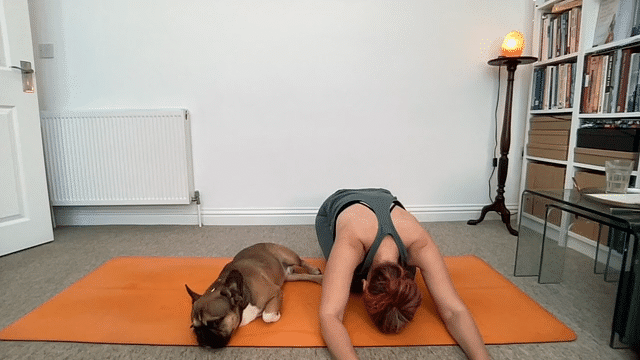
New Online Course
Yoga, Movement & Calm for Dog Parents
Practical practices to stay calm, present, and connected — for you and your pup
What’s inside:
Welcome + your foundations
Practices to support stability, and strength for legs and shouldersPre- and postwalk practices
Short videos to stretch and get ready for walks. Including restorative restful yogaSoothing the nervous system
With restorative practices, breathing and rest. Aromatherapy for youConnecting with your dogs
Massage, touch and including your furbabies in your practiceAll videos to mix and match
A space for ALL the videos for easy accessA few more bits to be added but you can still access the course NOW
Ready to begin?
Instant access, Self-paced, Worldwide access, One-time-only pricing
💷 Course Price: £47, The course is included in the Standard and Supporter Memberships starting at £25/month
